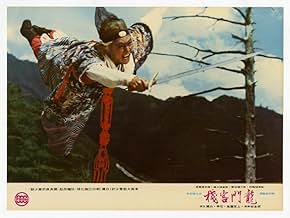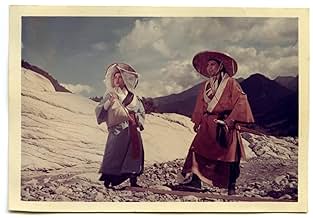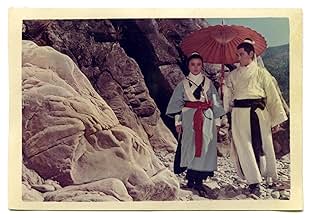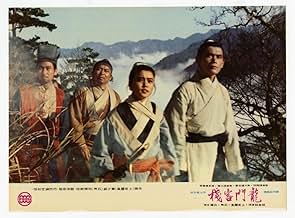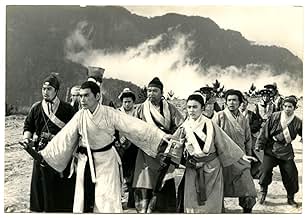VALUTAZIONE IMDb
7,4/10
3970
LA TUA VALUTAZIONE
Aggiungi una trama nella tua linguaWhen the children of an executed General are pursued in 1457 China, some heroic martial arts swordsmen intervene.When the children of an executed General are pursued in 1457 China, some heroic martial arts swordsmen intervene.When the children of an executed General are pursued in 1457 China, some heroic martial arts swordsmen intervene.
- Premi
- 1 vittoria e 1 candidatura in totale
Recensioni in evidenza
10Deusvolt
I saw this during its initial run under the title "Dragon Inn."
This is no ordinary swordplay movie. It is a visual treat of ancient Chinese costumes and weaponry. The traditional Chinese instruments used for the background music added an otherwordly flavor. I left the theatre wondering if the movie was truly historical.
The head of the Yu clan has been condemned to death by the evil prime minister who has usurped imperial power. A palace eunuch who managed to claw his way to power, he is also reputed to be China's greatest swordsman. He plots to eliminate the entire Yu family but is opposed by a master swordsman and swordswoman.
A memorable scene that has nothing to do with fighting is the dinner at Dragon Inn which introduced me to the Mongolian Fire Pot (shabu-shabu) style of eating. To the uninitiated, there is a fire pot in the middle of the table decked out with all sorts of raw food which you put into the boiling water of the firepot and eat them as they are cooked. The cooking water is sipped as soup.
I took my little sister to see it and from then on she got hooked on Chinese swordplay movies. She began reading up on ancient China and in college she majored in history and archaeology -- all because I took her to see Dragon Inn.
I am gratified to learn recently that the female supporting actress Feng Hsu moved on to become a producer-director herself with a number of critically acclaimed films to her credit. I look forward to seeing them soon.
This is no ordinary swordplay movie. It is a visual treat of ancient Chinese costumes and weaponry. The traditional Chinese instruments used for the background music added an otherwordly flavor. I left the theatre wondering if the movie was truly historical.
The head of the Yu clan has been condemned to death by the evil prime minister who has usurped imperial power. A palace eunuch who managed to claw his way to power, he is also reputed to be China's greatest swordsman. He plots to eliminate the entire Yu family but is opposed by a master swordsman and swordswoman.
A memorable scene that has nothing to do with fighting is the dinner at Dragon Inn which introduced me to the Mongolian Fire Pot (shabu-shabu) style of eating. To the uninitiated, there is a fire pot in the middle of the table decked out with all sorts of raw food which you put into the boiling water of the firepot and eat them as they are cooked. The cooking water is sipped as soup.
I took my little sister to see it and from then on she got hooked on Chinese swordplay movies. She began reading up on ancient China and in college she majored in history and archaeology -- all because I took her to see Dragon Inn.
I am gratified to learn recently that the female supporting actress Feng Hsu moved on to become a producer-director herself with a number of critically acclaimed films to her credit. I look forward to seeing them soon.
I saw this film in the 60's, and have yet to find one to beat it. 'Hidden Dragon, Crouching Tiger' has to come in behind this masterpiece. The use of new actors and actresses, the adoption of well-timed traditional Chinese music, e.g. to usher in the villain, the innovative action sequence in sword fights, all added to the brilliance of this film.
Yes, there are shortcomings. Toward the end, and the climax, the anti-gravity leaps to the trees were overdone and unnecessary. Regardless, this film resembles the best of the traditional, addictive Chinese martial art novels that once consumed many hours of the armchair martial art addicts.
Yes, there are shortcomings. Toward the end, and the climax, the anti-gravity leaps to the trees were overdone and unnecessary. Regardless, this film resembles the best of the traditional, addictive Chinese martial art novels that once consumed many hours of the armchair martial art addicts.
I speculate that King Hu must have left Shaw Brothers with a bad taste in his mouth after doing "Come Drink With Me". "Come Drink with Me" is also one of the greatest martial arts movies despite having room for improvement. This movie feels to me like King Hu made those improvements in it. I consider this his is his masterpiece. I compare it to the movies of Akira Kurosawa. Too bad that King Hu was nowhere near as prolific. This movie could even be considered his one hit wonder.
King Hu seemed to realize the claustrophobic situation of of the good guys and bad guys face to face in the Dragon Inn was great drama but it had to be contrasted with as much wide open space as possible. In "Dragon Inn" most scenes outside the inn are shot in expansive panoramas. Like Kurosawa, King Hu appreciated the way moving the camera brought the audience into the scene. He used tracking shots, particularly during fight sequences, to get this feeling.
Hang Ying-Chieh gets credit as action coordinator. He was the Big Boss in Bruce Lee's "The Big Boss". Remember when Bruce is cut, wipes off his blood then tastes it? Hang Ying-Chieh does the same here. The sword fights are Japanese style - starting with a suspenseful face off, then a sudden attack to cover the distance, just a few quick strokes of action, then stop and wait a few seconds to feel the results. A real sword cut is initially almost painless so the person cut doesn't know until he sees the effect of the cut.
I rate this as one of the best of 1967 and I recommend it to everyone - not just fans of the genre - to everyone.
King Hu seemed to realize the claustrophobic situation of of the good guys and bad guys face to face in the Dragon Inn was great drama but it had to be contrasted with as much wide open space as possible. In "Dragon Inn" most scenes outside the inn are shot in expansive panoramas. Like Kurosawa, King Hu appreciated the way moving the camera brought the audience into the scene. He used tracking shots, particularly during fight sequences, to get this feeling.
Hang Ying-Chieh gets credit as action coordinator. He was the Big Boss in Bruce Lee's "The Big Boss". Remember when Bruce is cut, wipes off his blood then tastes it? Hang Ying-Chieh does the same here. The sword fights are Japanese style - starting with a suspenseful face off, then a sudden attack to cover the distance, just a few quick strokes of action, then stop and wait a few seconds to feel the results. A real sword cut is initially almost painless so the person cut doesn't know until he sees the effect of the cut.
I rate this as one of the best of 1967 and I recommend it to everyone - not just fans of the genre - to everyone.
It's China in the year 1547. A minister has been executed and his two younger children sent into exile ... officially. The Eunuchs in charge and the bad boys of the Eastern Gate intend to kill them at the Dragon Inn on the border. As they move, however, an assortment of skilled swordsmen (and one swordswoman) show up at the Inn...
King Hu's martial arts movie has nasty villains, loner heroes, magnificent wide-screen Eastmancolor images (restored in 2013) and all sorts of crazy fight sequences in a dazzling array. There seem to be a few plot holes (people keep pausing in their fighting to talk), but that may be a matter of the standards of the Taiwanese cinema as opposed to my more western ideas. What strikes me in the storytelling technique is that the film maker seems to have seen and been influenced by the Man With No Name" trilogy, or at least YOJIMBO and SANJURO, drawing the same conclusions about cinema that Leone had. Chun Shin's character enters the Inn and encounters the agents of the Eastern Gate with the same wry, skilled, deadly sense of humor that Eastwood showed in his performances.
I'm not familiar with Taiwanese film-making of this era and genre. My experience has tended toward the Hong Kong offerings, with an emphasis on the Jacky Chan and Stephen Chow comedies. This is a very impressive introduction to the style and to King Hu
King Hu's martial arts movie has nasty villains, loner heroes, magnificent wide-screen Eastmancolor images (restored in 2013) and all sorts of crazy fight sequences in a dazzling array. There seem to be a few plot holes (people keep pausing in their fighting to talk), but that may be a matter of the standards of the Taiwanese cinema as opposed to my more western ideas. What strikes me in the storytelling technique is that the film maker seems to have seen and been influenced by the Man With No Name" trilogy, or at least YOJIMBO and SANJURO, drawing the same conclusions about cinema that Leone had. Chun Shin's character enters the Inn and encounters the agents of the Eastern Gate with the same wry, skilled, deadly sense of humor that Eastwood showed in his performances.
I'm not familiar with Taiwanese film-making of this era and genre. My experience has tended toward the Hong Kong offerings, with an emphasis on the Jacky Chan and Stephen Chow comedies. This is a very impressive introduction to the style and to King Hu
Terrible acting by all of the cast and terrible dialog albeit mediocre directing. The reason why this first "Dragon Inn" is quite famous and popular is because it's the earliest break-through of the Taiwanese martial arts and swordsmanship that was in a newer method to shoot a action movie by Taiwanese movie maker. But if by the standard of the up to date technique, it's very primitive and borderline shallow. The fighting scenes are so awkward and raw, showing strongly unnatural, poor and rigid prearranged fighting scenes, so awkward and even childish by today's standard. The acting, the make-up, the costumes all looked quite shallow, the dialog was even worse. But the English subtitles were translated pretty correct and appropriate, matching well with the Chinese language. This is a quite mediocre Taiwanese product with very poor directing and acting. It's a classic and even a cult-like Chinese swordsmanship movie, but if compare with the Japanese samurai films by the Japanese screenplay writers, their directors and the performances of the Japanese actors, this "Dragon Inn" simply looked like a child play, but if compare it with those ridiculous swordsmen and martial arts movies produced by the "Shaw Brothers" later, it still looked better.
Lo sapevi?
- QuizDirector King Hu encouraged his martial arts choreographers to draw from the alternately fluid and rhythmic movements of Chinese opera. Rather than resorting to fast or slow motion, footage printed backward, animation, or other early special-effects techniques, the filmmaker relied as much as possible on the actual skills of his performers and on the magic of editing.
- ConnessioniFeatured in Goodbye, Dragon Inn (2003)
I più visti
Accedi per valutare e creare un elenco di titoli salvati per ottenere consigli personalizzati
- How long is Dragon Inn?Powered by Alexa
Dettagli
Contribuisci a questa pagina
Suggerisci una modifica o aggiungi i contenuti mancanti



